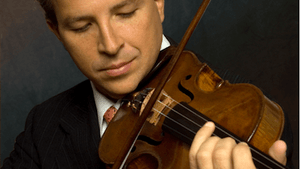Stay in the Loop
BSR publishes on a weekly schedule, with an email newsletter every Wednesday and Thursday morning. There’s no paywall, and subscribing is always free.
Composers with allusions
Network for New Music and Chamber Orchestra of Philadelphia's weekend concerts

Should composers write instrumental music that depicts specific subjects, or should they write music we listen to purely for its musical qualities? Victorian composers turned out a lot of music linked to landscapes and literary allusions. Their successors favored “pure music” for most of the 20th century. Today, composers seem to prefer the 19th-century approach. Last weekend, the Network for New Music and the Chamber Orchestra of Philadelphia presented programs dominated by contemporary compositions with subjects taken from literature, nature, and historical events.
Network’s program premiered six pieces composed in response to a poem created for the occasion. The Chamber Orchestra’s “American Voices” program included music based on subjects as varied as a video game and the composer’s feelings about October.
Satisfying programs
The Network program had a complicated relationship to a 19th Century novel, Hyperion, by German Romantic author Friedrich Hölderin. Music director Linda Reichert asked poet Susan Steward to write a poem in response to the novel and six composers were then asked to write pieces inspired by the poem. The result was a group of pieces that were always expressive but sometimes substituted musical gestures for true inventiveness.
The composers featured at the Chamber Orchestra were exposed to another temptation: The string orchestra’s tendency to invite rhapsodizing with big heartfelt surges. Most of them succumbed more than they should have.
Both programs included satisfying works that managed to avoid both traps. Andrew Rudin got the Network program off to a good start. His quartet for flute, violin, cello, and piano alternated dramatic expressiveness with beautiful songs for the three melody instruments.
My personal favorite on the Network menu was Re-Chia Chen’s The Looming Sky. For Chen, the poem’s images reminded her of an experience that made her aware of all the things happening simultaneously in the natural world. She captured that feeling in a quartet for piano and string trio packed with musical events.
Unusual source of inspiration
Artists have been turning commercial assignments into real art ever since they discovered they could be paid for their labors. Why should composers who write video games be any different? At the Chamber Orchestra concert, Austin Wintory’s score for the video game Journey evoked all the feelings associated with a romantic saga. You could revel in an enticing emotional world without buying a game system.
The star turn on the first half of the Chamber Orchestra concert was Daron Hagen’s Songbook, with David Ludwig as violinist in a piece billed as a concerto for violin, string orchestra, harp, and percussion. Hagen built his first three movements around two Irish folk tunes, including a song about the potato famine, and the Appalachian song “Over Yandro.” Then, in the fourth movement, he created a powerful ending by combining the folk tunes with the best-known anti-slavery song, Amazing Grace. His musical structure merged the agony of the African slave trade with the misery of immigrants who braved the ocean to escape starvation.

At the Network concert, Gerald Levinson added another memorable event to my weekend with the final moments of a quartet for alto flute, viola, cello, and contrabass. Steward’s poem contained a line from Hölderin that summed up the novelist’s somewhat gloomy worldview: “Because it is winter everywhere, I spin my cocoon, I dig my grave.” Levisohn’s quartet ended ethereally, high on the strings, in a way that reminded me of one of Albert Camus’s most famous lines, “In the midst of winter, I found that there was in me an invincible summer.”
Pure music
The two most inventive pieces on the Chamber Orchestra program were both examples of pure music. Kenneth Fuchs’s 2008 American Rhapsody is a truly American version of the rhapsody, catering to an American taste for pace and variety. It offered something new every 30 seconds and each new thing followed naturally out of the last.
When Dirk Brossé took his bows after the Fuchs, he told the audience “I love this music.” I shared his feelings.
The piece that closed the Chamber Orchestra program, Walter Piston’s 1941 Sinfonietta, was just as varied and unpredictable. Piston has never been my favorite 20th-century American composer. He often wrote music that seemed designed to irritate audiences. The Sinfonietta was a major exception.
Music that’s tied to specific subjects can make important statements and lead composers in unexpected directions. But there’s still room in the world for music with titles like Piano Trio No. 2 and String Quartet No. 8.
What, When, Where
Network for New Music: Poetry Through Music. Rudin, A Sudden Waking; Brown, Figure to Ground; Chen, The Looming Sky; Levinson, ....because it is winter everywhere....; Capanna, Too light, too light, like a sudden waking; Krause, from quiet scripts. Linda Reichert, artistic director. Network for New Music Ensemble. February 26, 2017 at the Settlement Music School, Mary Louise Curtis Branch, 416 Queen Street, Philadelphia. (215) 848-7647 or networkfornewmusic.org.
Chamber Orchestra of Philadelphia: The Sounds of America. Corigliano, Voyage for String Orchestra; Wintory, Apotheosis from Journey; Hagen, Songbook: Concerto for Violin, String Orchestra, Harp and Percussion; Whitacre, October; Fuchs, American Rhapsody; Piston, Sinfonietta. Michael Ludwig, violin. Dirk Brossé, conductor. February 27, 2017 at the Kimmel Center for the Performing Arts' Perelman Theater, 300 S. Broad Street, Philadelphia. (215) 545-1739 or chamberorchestra.org.
Sign up for our newsletter
All of the week's new articles, all in one place. Sign up for the free weekly BSR newsletters, and don't miss a conversation.

 Tom Purdom
Tom Purdom